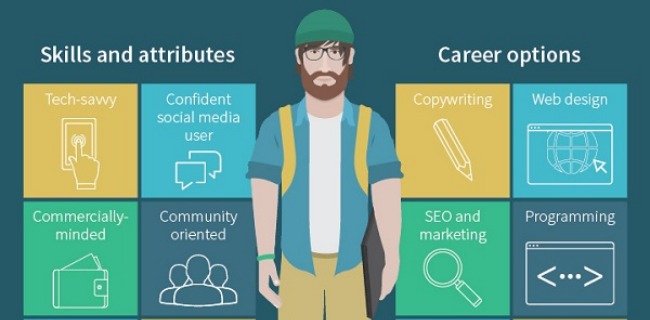Digital nomads are people who use telecommunications technologies to earn a living and, more generally, conduct their life in a nomadic manner. Such workers typically work remotely—generally from foreign countries, coffee shops, public libraries, co-working spaces and even recreational vehicles—to accomplish tasks and goals that traditionally took place in a single, stationary workplace. - Wikipedia
When I first heard the term “Digital Nomad” I was reading an article about the Remote Year program. It sounds so perfect: work remotely while you travel around the world. The program promises to take you and a group of other digital nomads to live in twelve different cities around the world during the course of one year. They provide you with the flights, accommodation, workplace with good internet and activities for learning and networking:
Spending one month in each location, the community will connect with local cultures and business ecosystems, forming lifelong, borderless personal and professional relationships along the way. Together we will pave the way for the digital nomad lifestyle and shape the future of work.
I’ve adopted the life of a digital nomad just over a year ago when I quit my job and decided to work remotely mostly doing UX projects. Since then, I’ve been reading a bit about the topic and also joining a few online groups and Facebook pages such as:
Doing a quick research on Google and you will find so many blogs, stories, platforms, groups, websites. It is amazing how the movement has been increasing and getting more and more participants around the world. Specialist sites like Hubstaff Talent even help companies connect to and build teams of experienced digital nomads from the ground up.

Source: The Next Web
I remember I used to find many articles and cover magazines with pictures of young and beautiful people working on their MacBooks by the beach. Oh yeah! That was the life that I wanted for me. That time, I was living in Los Angeles, so it sounded perfect to be one of that beautiful pictures of people working by the beach and I did it. Venice Beach and Santa Monica were my favorite places to start it. After a few days working by the beach, my computer stop being so happy: it was overheating and needed to being constantly opened to clean the sand stuck on it.
Then I’ve started going to nice cafes with wi-fi to work on my projects. The first challenge that I found was the Internet. Wi-fi at most of the commercial places are great for Social Media, to check your email account, even for WhatsApp etc. But when you really need a great internet, you can not 100% rely on them. So I’ve decided to test cafes with wi-fi around the city. I found a few that worth it but I kept facing other challenges: finding an available table could be tough, especially if I needed one close to energy outlets (yeah, batteries, unfortunately, don’t last for as long I wish they could); finding a not so noisy place from where I could have a nice skype call without the person (or people) from the other side complaining that they couldn’t hear me or that they could hear too much of the background noise.
In the beginning, it was tougher than I imagined, but soon I had a kind of map of places to go. I knew the best times when the places were not packed, easy to find outlets and available tables, where there were the best wifis, better places to make calls, I’ve invested in good headphones. Sometimes, I went to co-spaces, I’ve tried a few on Silicon Beach (Los Angeles, Venice Beach, Santa Monica). I was learning how to be a digital nomad. After Los Angeles, I’ve moved to NYC, spent time in Brazil in different cities, moved to Italy, traveled around there, now I am living in Dublin. Now I know how also choosing places to live (rooms, hostel, flats etc), because sometimes you really need a private place to be able to concentrate.
Besides the physical spaces, you start also learning about online tools which can help you not only to get your job done – online platforms such as FluidUI are essential for it – but to also to organise your life, to communicate efficiently with your team, your client. Thank God, we have more and more good tools being launched to help us digital nomads to work. Being a digital nomad makes you relearn and rethink how to work. And that is amazing, but painful. You also start learning that you have to keep only a few stuff if you really want to keep moving. When I moved from Los Angeles to NYC, it was really tough cross the country with so much stuff. The worse were the books (I LOVE books, I have bunch of them), which I needed to leave with a friend in LA. So now I only carry my Nook and my Kindle. By the way, I recommend a book which helped me learn how to have a more lean life: The Life-Changing Magic of Tidying: A Simple, Effective Way to Banish Clutter Forever by Marie Kondō.

The list of challenges of being a digital nomad doesn’t stop here. There are so many things to learn and so many habits and routines to be altered and adapted. I am glad that there are bunch of good articles and blog posts which help those who want to be or who want to improve their nomad lives with useful tips and stories of from the lives of other nomads:
In addition to those mentioned above, DesignTaxi has published amazing inphograraphic by UK-based hotel booking website Hotels4U.

I’ve asked a few friends about being digital nomads, its advantages and disadvantages. I got interesting answers that I would share with you:
I have a daily plan of my business activities. Every day we speak through Slack (an online platform for remote communication). All meetings are made by Skype or Zoom. We have meeting to set goals every 10 days and a weekly team meeting. The advantages of being a digital nomad are many! Greatly improves the quality of life: I do not waste time on traffic, my schedule is very flexible, I can study for my masters and can do physical activities. However, you need to organise yourself for working remotely and be effective. Otherwise you end up wasting time. You must be committed and responsible. For many people working remotely is a big challenge because you really need to be disciplined. If you be, certainly you will stand out from the rest of professionals. - Milena Gasman (Social Media Strategist)
>To be effective working remotely, first, you will want to have a good computer, good connection, knowing a good computer technician for emergencies. Have a second computer or Ipad to be stand by. Keep it clean and organized environment. The interaction with the rest of the team is made by e-mail, gtalk, whatsapp and also phone calls if needed. It depends on the work to be done, I recommend different tools such as Google Drive, Google Docs and Gmail. - Thaís Medina (Social Media Coordinator at FSB Digital)
Another friend, André Lelis, who is an agency founder, developer and lead a remote team, has shared a great video summarizing how to be effective working remotely:
I can see how it has been becoming easier to be a digital nomad: infrastructure has been improving; wifi connection around the world has getting better and really worldwide; there are plenty of great online tools to make work remotely possible; we have airbnb and other platforms to find places to stay; alternative ways, such paypal and venmo, to get paid; you can find great deals for flight tickets; and companies which has been helping to make digital nomad life easier. However, to exist this kind of professionals, it is also essential that the companies keep opened to work with digital nomads and getting prepared for this. FluidUI is one of these companies who has working very well with remote team, but it is not that easy, like Dave Kearney, FluidUI founder, explains:
Having a remote team is good and bad at the same time. We get to work with great people no matter where they are and we offer a better quality of life - no/less commuting, no chaotic / busy workplaces, more flexible working hours and a team of really smart people. Obviously from a US or Irish perspective, being able to avail of people who live in lower cost parts of the world is also quite valuable. Working remotely helps you evaluate the quality of work, not whether someone is at a desk from 9-5.30. On the flip side, it can make the necessary quick / easy communication harder, so we need to get together frequently to get lots of small things done. Also, it’s not suited for everyone, you have to be professional and have a solid level of self discipline. We also use our Dublin base when working with interns as that is something that doesn’t work as well in an online environment.
In the bottom line, the truth is that the world has changing. The way we’ve been living and working as well. We have to be prepared, adapt quickly, don’t lose the path, keep focused and be resilient. I am still learning how to be a digital nomad and still have been facing daily challenges. If you are also a digital nomad or have been working remotely, I would love to have you sharing with us your challenges and tips to overcome them. If you have just decided to join the movement, let’s keep learning and improving together. Welcome to the world of digital nomads!